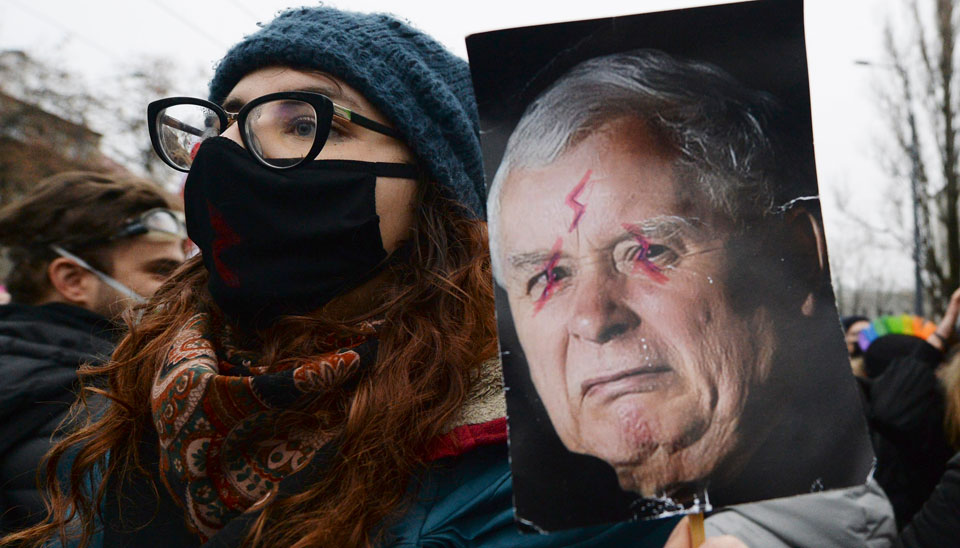
The movers and shakers of right-wing populism rule present-day Poland. They have hijacked Polish democracy and are systematically destroying it. In its place is an authoritarian regime that has no qualms about adopting the rhetoric of intolerance and quasi-fascism.
In the space of a single generation, the Polish “experiment with democracy” has delivered an anti-democratic nightmare: a land of systemic repressions against women and the LGBTQ community, discrimination against the Roma, German, and Ukrainian minorities, and others, the demonization of refugees, draconian censorship in schools and universities, and gross mismanagement of the COVID-19 pandemic.
As an academic and gay activist, one of the authors of this article, Tomasz Kitliński, has been personally targeted by the ruling party, threatened with prosecution, and forced into exile in Berlin.
Over the past six years, the Committee for the Defense of Democracy (KOD, founded in 2015) has been active in a wave of mass protests by the LGBTQ community, and nationwide demonstrations on behalf of women—the Women’s Strike (Strajk Kobiet)—against extreme anti-abortion legislation.
At the time, the scale of the protest gave rise to extraordinary hope. It was founded in an entirely new social phenomenon, a queer/feminist alliance that expressed itself on the streets with rainbow flags and imaginative protest art on cardboard, similar to those seen in Britain at Black Lives Matter marches. This new aesthetic expressed a multiplicity of opinion, and a multiplicity of lives, subjectivities, inspirations, and emotions.
It aspired to the constitution of a new democracy that was being written everywhere by everybody, citizens reinventing themselves and reinventing what society could be.
A major difference to the Solidarnosc demonstrations of the 1980s was that this time the marches were full of schoolchildren and young people—the Erasmus generation.
It would be wrong to see this as merely reactive or oppositional. What you could read from the cardboard were new structures of feeling, new forms of language, new and unexpected social alliances.
Even though the Strajk Kobiet achieved a remarkable mass mobilization, it was predominantly run by middle-class and professional women and failed to establish a coherent alliance with the working class. Much the same can be said for the LGBTQ community.
This failure to create an alliance with working-class organizations, including trade unions, impeded the achievement of their political objectives. In the absence of such an alliance and the prospect of sympathy strikes, the government simply beat back the protest and continued with its reactionary, regressive agenda.
The government rhetoric—exemplified by the utterances of Minister of Education Przemyslaw Czarnek—is characterized by hysterical anti-communism. Protesters, migrants, and LGBTQ people are all “communists” or “Lukashenko and Putin’s infiltrators.”

Designed to generate knee-jerk responses, this anachronism has no political relevance because there is no significant communist party in Poland, and the closest geographically “socialist” governments are in Spain and Portugal and without influence.
What it does do though is to corral the reactionary social prejudice of the regime in opposition to an imaginary scapegoat. Communism represents worker solidarity. It is anti-racist and opposed to state-monopoly capitalism. Communism embodies the principles of gender equality and social emancipation.
To be anti-communist is to disguise (and also to enact) a political agenda that is diametrically opposed to these values. It is to be racist, to be sexist, and to be repressive. It is to be (like the Nazis and present-day fascists throughout the EU) the willing instrument of monopoly capitalism.
The ruling elite that the Law and Justice Party (PiS) represents is an opportunistic nouveau riche-capitalist nomenclatura, and for social protest to be effective it must recognize the class basis of this regime and find common ground through class alliance.
While the opposition requires the consciousness of this objective social reality—this material truth—it can also benefit from a historical and cultural view of the different kinds of democracy that Poland has experienced, and enrich the picture.
For people of our generation, the events of July 1980 and the birth of Solidarnosc were formative. The model adopted by the new unions was not authoritarian but “self-governing,” and briefly the socialist economy coincided with a radical expansion of culture. If the base was socialist, the superstructure was self-governing Solidarity.
In time, Solidarity mutated away from these emancipatory beginnings. In the course of the 1980s, it became a tool for the capitalist West to pacify the Polish working class, and eventually to let it sleepwalk into the embrace of the new masters of the privatized economy and exploitation. It provoked a wave of emigration abroad, estimated at two million workers, that rivals the mass migration to the U.S. in the late 19th and early 20th centuries.
Why were the trade union leaders blind to this process and unable to resist this outcome?
The trade union, now split between left and right, sought accommodation with capitalism, rather than recognizing that the interest of its members lay in opposition to capitalist exploitation. It blithely accepted the support of committed anti-socialists like Thatcher and Reagan, and was blind to its role in dismantling socialism, and capitulating to capitalism. The workers, who had enjoyed privileged status, participated in their own abdication of power without realizing it.
Later, in 2009, the strike of cleaning ladies over pay and conditions succeeded when the workers themselves structured themselves as a self-organizing trade union. This gave democratic strength to the action and led to their success.
These are the lessons that must inform today’s resistance to Polish authoritarianism, and we must learn to distinguish genuine democracy from its coercive and negative other.
Democracy begins with self-government. To be represented in a democracy involves self-empowerment and self-affirmation in equal mixture.

When democracy is weaponized by the capitalist ruling class, we can recognize the exact antithesis of these values. Self-empowerment becomes self-negation. Individual courage becomes cowardice and vulnerability becomes aggression.
This internalized “self-negation” is an essential component of social control under capitalism and the means by which it disempowers the citizen to divide and rule the working class. When a system deploys self-negation, it is simply recruitment into the mob.
Against the specter of this kind of brutalizing coercion, we must revive the experience of true participatory democracy.
Those who rule Poland today fetishize the Polish constitution to defend their oppressive new laws in the face of the European charter of human rights. But, every day, they transgress the constitution that forbids discrimination against citizens “on any grounds whatsoever.” The government is acting illegally, and this transgression must be challenged in court.
Alongside such an action we must use every strategy, including cutting links with “LGBT free” towns (100), municipalities (50), counties (18), and provinces (four). We must protest against sending our military to support their xenophobic policies and resist this crude mono-cultural populism and the havoc it wreaks on the great majority of our fellow citizens.
Morning Star











